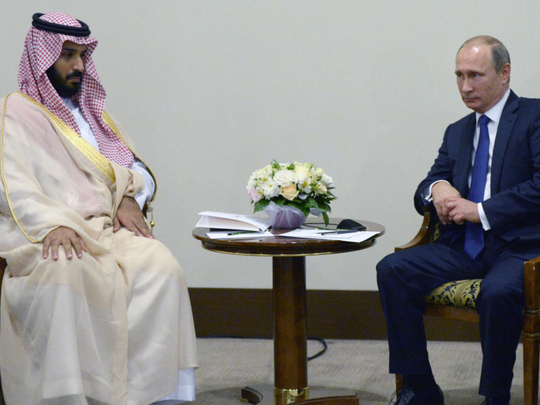
Beirut: Russian President Vladimir Putin’s weekend meeting with the powerful Saudi Deputy Crown Prince Mohammad Bin Salman was more than a Kodak moment for the two leaders.
The wars of Ukraine, Yemen, and Syria were all on the table. Small indicators are already emerging indicating that a regional breakthrough might be in sight, signed off by Moscow and Riyadh.
The main obstacle to date has been the future of Putin’s Syrian ally, President Bashar Al Assad.
Riyadh has aggressively taken sides with Syrian rebels fighting against the central government in Damascus. It has funded both politicians and rebels on the Syrian battlefield.
Last August, Saudi Foreign Minister Adel Al Jubeir said: “There is no place in Syria for Al Assad.” Two weeks later, he repeated the exact same line at the UN General Assembly, even threatening using force to ouster the Syrian president.
Something changed, however, when the Russian Army rumbled into Syria a few days later, providing the Syrian Army with modern Sokhoi fighter jets, sophisticated satellite imagery, and T-90 tanks.
The Russians have been striking at Syrian rebels trained and bankrolled by Saudi Arabia and the US, in the countryside of Homs, Hama, and Idlib. Their declared objective is to stabilise what they view as the legitimate government in Syria.
Last week, an ‘informed’ Saudi source was quoted in international media saying that Riyadh would retaliate by giving lethal weapons to the Syrians to use against the Russians and Al Assad.
Saudi Arabia’s ambassador to the UN said that he had “profound concerns” about the Russian escalation, but apart from lip service, the kingdom has done nothing to aid its Syrian proxies.
Russia even took the liberty to speak on behalf of Riyadh on Sunday. “We have closely cooperated with Saudi Arabia for years on the crisis in Syria. We have similar objectives when it comes to Syria,” Russian Foreign Minister Serge Lavrov said during his meeting with the Deputy Crown Prince, who is also the Saudi Defense Minister.
High on the list, he added, was preventing a “terrorist caliphate” from overtaking Syria.
Cooperation
What Prince Mohammad did say was that he was willing to cooperate with Moscow to reach a political solution, one however, that didn’t include President Al Assad. He didn’t say that this was a precondition for a grand deal on Syria, which of course, is music to the ears of the Russians.
A picture taken on October 5, 2015 shows Russian air force pilots and technicians checking a Russian Sukhoi Su-30 jet fighter at the Hmeimim airbase in the Syrian province of Latakia. (AFP)
Prince Salman does not want a confrontation with Moscow. On the contrary, he has been inching closer to the Russians while quietly distancing himself from its traditional allies in Washington, who have infuriated the kingdom by striking a historic nuclear deal with Iran, Saudi Arabia’s regional rival, in July.
This was made all the more easier by the demise of pro-US voices in the kingdom, like Bandar Bin Sultan, who was sacked, and Saud Al Faisal, who died this summer.
Prince Mohammad’s visit to Moscow was the second in less than a year, and last July, the Saudis pledged to invest $10 billion in Russia, and to buy Russian arms.
Additionally, Saudi Arabia has been more or less silent about Putin’s Crimean adventure, refusing to apply oil and gas sanctions on Moscow to punish Putin over Ukraine. Reciprocating last March, Putin has been relatively silent over the Saudi war in Yemen.
Saudi Arabia needs Russian support in Yemen as it is far more committed to securing his own backyard than to pick a fight with Moscow over Al Assad.
Saudi Arabia and other Gulf states have invested heavily in the war in Yemen and could even deploy more troops on the ground there to secure its interests.
As Yemen remains the priority, a ‘hands-off’ policy in Syria is more likely to be adapted in Riyadh. Interestingly enough, Moscow was the first world capital to recognise Saudi Arabia under King Salman’s father, Abdul Aziz Bin Saud in 1926.
Relations later soured over Soviet Communisim and Saudi Wahabism in 1938 and did not improve until the collapse of the Soviet Union.
In 1979, relations reached an all-time low when Riyadh channelled money and arms to Afghan rebels fighting a Soviet invasion of Afghanistan. Putin managed to turn a new page with Riyadh in February 2007 when he visited and met with then-King Abdullah.
- Sami Moubayed is a Gulf News columnist and Syria expert












